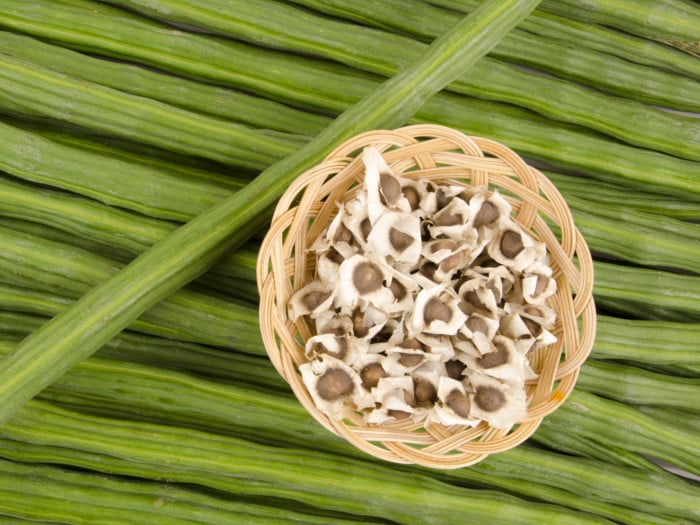People consume and cultivate moringa seeds for many different reasons, for culinary and medicinal applications.
What are Moringa Seeds?
Moringa seeds are the seeds from the pods of the drumstick tree, scientifically known as Moringa Oleifera. This plant is native to India, where the fresh seeds are widely eaten and enjoyed for their nutrient density. However, when the seeds are cooked or dried, they quickly harden and closely resemble beans. From that point, they can be used in many different culinary applications. Moringa seeds are edible, but they should be chewed, rather than swallowed whole. These seeds should also be cooked or dried before eating, rather than eating them raw from the pod. [1]
Moringa Seeds Nutritional Value
In terms of nutritional value, moringa seeds are a rich source of iron, potassium, vitamin A, vitamin C, calcium, amino acids, and dietary fiber. Each pod contains between 10 and 35 seeds, while one cup of pods contains a total calorie count of just under 40, as well as moderate amounts of protein and carbohydrates. There are also various antioxidants in these seeds, such as flavonoids and polyphenolic compounds. [2]

Moringa seeds are obtained from the pods of the moringa plant. Photo Credit: Shutterstock
Moringa Seeds Benefits
The major benefits of moringa seeds include their ability to boost the immune system, reduce blood pressure, relieve insomnia, and promote healthy hair, skin, and bones.
Immune System
Studies have found that these seeds have natural antimicrobial and antiviral properties, perhaps due to their large concentration of vitamin C, as well as various antioxidants that can boost the body’s defenses. [3]
Weight Loss
Some people take moringa seeds as a weight loss supplement because they are high in dietary fiber. When you eat some of these seeds, it will help to make you full, thus lowering your desire to snack between meals or overeat. [4]
Sleep Aid
One of the popular uses of these seeds is as a sleep aid. Reports show that people who steep moringa seeds in water for 15 minutes and then drink the water before bed have a more restful sleep, and feel more energized in the morning.
Diabetes
As per a research published in the journal BioMed Research International in 2015, treatment of diabetic rats with 50 or 100 milligrams of moringa seeds powder helped in improving the condition. More research on this is still required. [5]
Blood Pressure
Potassium is found in rich supply within moringa, which can act as a vasodilator and relieve strain on the entire cardiovascular system.
Hair Care & Skin Care
Polyphenols, flavonoids, and various minerals can all help boost the health of the skin, as well as the strength and durability of the hair. [6]
Anemia
With very impressive levels of iron, these seeds are able to boost circulation and prevent the symptoms of anemia.
Energy Levels
If you need to generate more energy, having a good supply of carbohydrates and protein is an excellent start, and these seeds are rich in both of these nutrients. [7]
Other Benefits
Due to the great antibacterial, anti-fungal, and anti-aging properties, moringa seeds can help regulate cholesterol, prevent erectile dysfunction, and improve heart, brain, liver, and eye health. These seeds also help treat ulcers, joint pain, and improve digestion.
How to Eat?
If you want to add these seeds to your daily diet, the first thing to know is to start slow and consume in moderation.
- Some people enjoy cooking the seeds in oil like popcorn to make a puffy and delicious snack.
- Some people also like to include these dried seeds in casseroles, sauces, bread mixes, soups, and stews, among others.
- Generally speaking, don’t consume more than 3 grams of these seeds two times per day, if you are using them for medicinal purposes.
Side Effects
Despite the many benefits, there are some side effects of eating these seeds in excess, such as the following:
- Nausea
- Vomiting
- Gastrointestinal discomfort
Furthermore, if you are pregnant or breastfeeding, be sure to speak with your doctor before adding any new herbal supplements to your diet.
